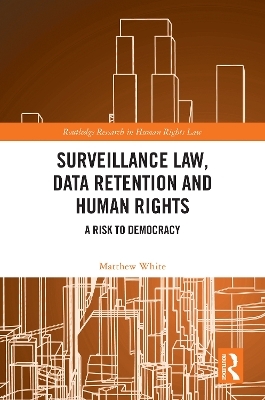
Surveillance Law, Data Retention and Human Rights
A Risk to Democracy
Seiten
2024
Routledge (Verlag)
978-1-032-07599-0 (ISBN)
Routledge (Verlag)
978-1-032-07599-0 (ISBN)
This book analyses the compatibility of data retention in the UK with the European Convention on Human Rights. This is explored through a variety of ways including providing an account of democracy and why secret surveillance poses a threat to it, and assessing the seriousness that data retention poses to fundamental rights.
This book analyses the compatibility of data retention in the UK with the European Convention on Human Rights (ECHR). The increase in the use of modern technology has led to an explosion of generated data and, with that, a greater interest from law enforcement and intelligence agencies. In the early 2000s, data retention laws were introduced into the UK, and across the European Union (EU). This was met by domestic challenges before national courts, until a seminal ruling by the Court of Justice in the European Union (CJEU) ruled that indiscriminate data retention was incompatible with EU law. Since then, however, the CJEU has revised its position and made certain concessions, particularly under the guise of national security. This book focuses on data retention in the UK with the principal aim of examining compatibility with the ECHR. This is explored through a variety of ways including providing an account of democracy and why secret surveillance poses a threat to it, a history of data retention, assessing the seriousness that data retention poses to fundamental rights, the collection of rights that are affected by data retention which are crucial for a functioning democracy, the implications of who can be obligated to retain (and what to retain), the idea that data retention is a form of surveillance and ultimately, with all things considered, whether this is compatible with the ECHR. The work will be an invaluable resource for students, academics, researchers and policy-makers working in the areas of privacy, human rights law and surveillance.
This book analyses the compatibility of data retention in the UK with the European Convention on Human Rights (ECHR). The increase in the use of modern technology has led to an explosion of generated data and, with that, a greater interest from law enforcement and intelligence agencies. In the early 2000s, data retention laws were introduced into the UK, and across the European Union (EU). This was met by domestic challenges before national courts, until a seminal ruling by the Court of Justice in the European Union (CJEU) ruled that indiscriminate data retention was incompatible with EU law. Since then, however, the CJEU has revised its position and made certain concessions, particularly under the guise of national security. This book focuses on data retention in the UK with the principal aim of examining compatibility with the ECHR. This is explored through a variety of ways including providing an account of democracy and why secret surveillance poses a threat to it, a history of data retention, assessing the seriousness that data retention poses to fundamental rights, the collection of rights that are affected by data retention which are crucial for a functioning democracy, the implications of who can be obligated to retain (and what to retain), the idea that data retention is a form of surveillance and ultimately, with all things considered, whether this is compatible with the ECHR. The work will be an invaluable resource for students, academics, researchers and policy-makers working in the areas of privacy, human rights law and surveillance.
Matthew White is Research Fellow at the University of Southampton.
1. Introduction and Methodology; 2. An Introduction to Communications Data Retention and its (il)legality; 3. Communications data is just as, if not more, intrusive than content; 4. Data Retention, a fundamental rights issue? Article 8 ECHR and Article 7 EU Charter underpinning democracy in the digital age?; 5. Communications Data Retention as Mass Secret Surveillance within Surveillance?; 6. Who is obligated to retain? Everything that ‘communicates’?; 7. Data Retention is Incompatible with the ECHR– Legality and Legitimacy; 8. Data Retention is Incompatible with the ECHR – Necessity, Proportionality, Articles 6 and 14 and Data Protection; 9. Conclusions
| Erscheinungsdatum | 22.08.2024 |
|---|---|
| Reihe/Serie | Routledge Research in Human Rights Law |
| Verlagsort | London |
| Sprache | englisch |
| Maße | 156 x 234 mm |
| Gewicht | 890 g |
| Themenwelt | Geisteswissenschaften ► Philosophie |
| Recht / Steuern ► Allgemeines / Lexika | |
| Recht / Steuern ► EU / Internationales Recht | |
| Recht / Steuern ► Öffentliches Recht ► Verfassungsrecht | |
| ISBN-10 | 1-032-07599-6 / 1032075996 |
| ISBN-13 | 978-1-032-07599-0 / 9781032075990 |
| Zustand | Neuware |
| Haben Sie eine Frage zum Produkt? |
Mehr entdecken
aus dem Bereich
aus dem Bereich
Buch | Hardcover (2024)
C.H.Beck (Verlag)
75,00 €


